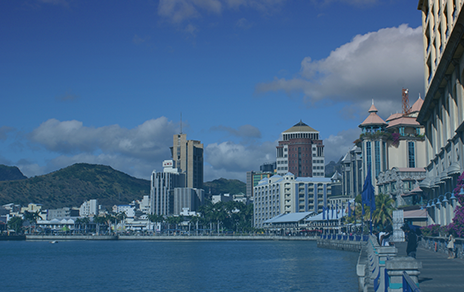Mauritius’s economic stability, genetic diversity, cost competitiveness, and location make it a perfect location for clinical research; a fact the state is now actively promoting.
A further vision of the Mauritian government is to transform the island into a medical hub for clinical research. Besides political and economic stability, a number of variables create the perfect scenario for this to happen. Firstly, the genetic diversity of the population — 68 percent of Mauritians are of Indian descent, 33 percent of African origin, 3 percent Sino-Mauritian and 2 percent European — provides a unique combination. “Our population is unique in its multi-ethnicity, skin-diversity and different lifestyles,” highlights Deyna Sooben, managing director of Insight Research, a clinical research organization (CRO) established on the island in 2014.
“This combination patterns a large pool of diverse patients which serve multiple forms of research.” Besides genetic diversity, the burden of diseases of the Mauritian population mirrors the therapeutic areas that worldwide are gaining the attention of big pharma: cardiovascular and metabolic diseases such as diabetes, which is estimated to affect nearly 25 percent of Mauritians; orphan diseases such as Palmoplantar Keratoderma and Lamellar Ichthyosis; skin conditions such as acne, psoriasis, as well as pigmentation disorders such as melasma or vitiligo; and infectious diseases such as Chikungunya and dengue.
The second variable is cost competitiveness. “Costs associated with pre-clinical and clinical research in Europe will continue to increase,” explains Arnaud Lagesse, CEO of GML and shareholder of CIDP. “In Mauritius, we have the expertise, the resources and the advantage of a very slight time difference with Asia and Europe to deliver the same quality of pre-clinical and clinical research for a fraction of European prices.”
The island’s location between Africa and Asia is also seen as of great advantage. “Mauritius is located in a strategic position, on the old trade routes of the Indies, a trade route which has recently been revitalized,” points out Jean–Louis Roule, CEO of CIDP, who additionally identified in the geographic location of the island a niche to leverage. “The fact that it is situated in the southern hemisphere was particularly important, as it allowed us to develop a whole line of research in photobiology and conduct studies on tanning, melanoma and cancer.”
The promulgation of the Clinical Trials Act in 2011 has paved the way for CROs to carry out clinical trial activities in Mauritius and has provided the island with a solid regulatory framework to conduct clinical research, with three main committees acting as regulatory bodies, namely the Clinical Research Regulatory Committee, the Ethics Committee and the Pharmacovigilance Committee. The pending enactment of the Preclinical Research Bill is estimated to further boost R&D within the pharmaceutical research value chain.
“Of upmost significance to us is the Pre-Clinical Research Bill, which has been pending for years now,” points out Lagesse. “Currently, we are only allowed to engage in clinical research in its final stages, mostly in cosmetics. As diabetes is an important issue for Mauritius, our aim is to grow into medical research, but our fundamental aspiration is to have a full-service supply chain provider, from drug discovery to the final stages of clinical sciences. To do this, we need clear legal definitions and structures, and an adequate regulatory framework. Pre-clinical testing is politically sensitive but it must be discussed.”
One of the main challenges most actors seem to share is the image of the island, still mainly linked to sun and beaches. “When we started CIDP, we were confronted by the challenge of Mauritius’ low profile outside of its traditional sectors: textiles and tourism,” he admits. “In a lot of presentations, I could see people smiling and thinking – do people really work in Mauritius? The goal which we set ourselves, with Her Excellency Ameenah Gurib Fakim, is to promote Mauritius as a research destination.
Salim Ismail, the Chairman and CEO of Socota Group, the promoter of the BioPark, has also been active in this area. It’s been hard, but we can see a new image of Mauritius starting to emerge: not just a vacation stop, but an intelligent island.” Lagesse agrees on this point: “Mauritius must be rebranded. It is essential that our government utilizes its best talent to brand Mauritius for its diverse offerings, which extend vastly beyond simply nice beaches and tourism.”
However, things seem to be slowly but steadily changing, and this is also thanks to the newly appointed president. “I observe that people in Europe begin to understand Mauritius for the unique assets it offers for businesses and not just as a sun and see island,” observes Sooben. “In the US, nobody knows about Mauritius, which provides me with the opportunity to express the right image.
The fact that Her Excellency Ameenah Gurib-Fakim, an internationally renowned female scientist, is our head of state helps me in portraying the right image of Mauritius—a business friendly, intelligent and innovative country— to the world.” QuantiLAB has decided to make its service speak for itself. “Our approach, at QuantiLAB, helps me shape my clients’ and partners’ perception of Mauritius,” stresses Baudot. “My mission is to communicate the vision of a country rooted in the values of multiculturalism, multilingualism, consolidation and tolerance. I believe my team is a microcosm of Mauritius; that exhibits all these qualities. This allows me to be an effective spokesperson for Mauritius, and for our fantastic potential.”
Click here to read more articles and interviews from Mauritius.


